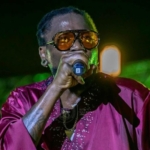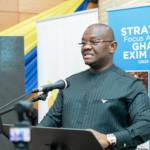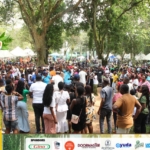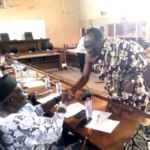
Fellow Ghanaians,
On 21st September, as our nation paused to commemorate the birthday of Osagyefo Dr Kwame Nkrumah – the man who gave us independence, the man who told us our destiny was bound with the destiny of Africa – something deeply troubling was unfolding. A group of Igbo Nigerians living peacefully in Ghana had planned to celebrate their annual yam festival, just as they have done on a few occasions in the past. It was to be a day of thanksgiving, a cultural expression of joy, a reminder of their roots. But they were stopped. The Ghana Police Service, acting on a letter from the Ga Traditional Council, warned that the festival could “breach the peace” and that Ghana must be careful not to “import foreign culture.”
That, fellow Ghanaians, was bizarre, embarrassing, and very dangerous. Because what exactly are we saying? That people who live among us, who work here, who contribute to our economy and to our cultural mosaic, cannot celebrate their own culture in our land? What are we becoming when we see a yam festival as a threat, when we think drumming, dancing, and thanksgiving by Nigerians will somehow destabilise our peace? This is not about culture. This is about creeping xenophobia, slowly and quietly seeping into our national fabric.
Respectfully, I must ask: is this not the same Ga Traditional Council, under the leadership of the Ga Mantse, that proudly celebrates Homowo abroad? Just last year, the Ga Mantse sprinkled Kpokpoi on the streets of London in a full Homowo celebration. Was that an “importation of foreign culture” into the UK? Did the British police stop it? Of course not. They facilitated it, they even provided security, because they understood it for what it was – a harmless cultural festival that enriches diversity.
And it is not just the Ga people. Ashantis celebrate Akwasidae in Washington and Berlin. Akuapems celebrate Odwira in Canada. Ewes celebrate Hogbetsotso in New York. Almost every major Ghanaian ethnic group has held its festivals abroad. No one calls it a threat. No one stops it. If anything, those festivals are celebrated and applauded. They showcase Ghanaian culture on global platforms. So why then do we, of all people, turn around and say Nigerians cannot do the same here?
Fellow Ghanaians, this creeping suspicion of foreigners, particularly Nigerians, is shameful. It undermines our history, our Pan-African identity, and our moral authority. Ghana is the land of Kwame Nkrumah, the land that championed African unity. Nkrumah did not fight for independence so that we could build walls between ourselves and our African brothers. He did not preach African liberation so that in 2025, we would be policing yam festivals. He said clearly: “The independence of Ghana is meaningless unless it is linked up with the total liberation of the African continent.” That was not mere rhetoric. It was a vision. And if that vision meant anything, then it means we must resist any slide into xenophobia.
Because xenophobia does not arrive with machetes and guns. It arrives with whispers and suspicions. It arrives with subtle bans and denials. It arrives when people begin to say, “They are taking our jobs. They are taking our culture. They are a threat.” And before long, those whispers become chants. Those suspicions become attacks. Shops are looted. People are killed. We have seen this movie in South Africa. Nigerians, Somalis, Zimbabweans, and Ghanaians all hunted in the streets because locals believed they were “taking over.” Is that what we want for Ghana?
Let us remember our own history. In 1983, Nigeria expelled Ghanaians en masse. Over one million of our people were forced out under the cruel banner of “Ghana Must Go.” Families were uprooted. Dreams were crushed. To this day, the phrase “Ghana Must Go” still evokes pain. But Ghanaians did not forget. And yet, some of us seem eager to replicate that same cruelty against Nigerians here. Have we forgotten that millions of Ghanaians live in Nigeria today, working, trading, and raising families? Do we want them to suffer reprisals because of our short-sightedness?
Fellow Ghanaians, Nigerians are not our enemies. Yes, there are Nigerians who break our laws. But so do Ghanaians. So do foreigners of every nationality. Criminality is not coded into nationality. If anyone, Nigerian or Ghanaian, breaks the law, the solution is simple: enforce the law. Prosecute them. But do not criminalise an entire people. Do not demonise their culture. Do not deny them the right to gather and celebrate peacefully.
And to our traders who say Nigerians are taking over our markets: let us be honest. The GIPC law is clear that foreigners cannot engage in petty retail. Enforce it. But let us also admit the truth: many Ghanaians themselves choose to buy from Nigerians and other foreign traders because of fairer prices, better customer service, and consistent stock. When the cedi gained strength some months ago, many Ghanaian traders refused to reduce prices, even though they are quick to increase them when the cedi weakens. Foreign traders, on the other hand, adjusted their prices downward, and customers responded. So perhaps instead of chasing foreigners from our markets, we should learn from them. Compete by treating customers better, not by hiding behind xenophobia.
Fellow Ghanaians, what happened with the yam festival is a symptom of a broader sickness. Over the past few months, we have seen protests in Accra targeting Nigerians, blaming them for crimes, painting them as a syndicate of lawlessness. We have seen traders threatening to sack Nigerians from Abossey Okai. We have heard political leaders pander to anti-Nigerian sentiment. And now we see traditional leaders joining the chorus. This is a slippery slope. Today, it is Nigerians. Tomorrow it could be Ivorians. Next week it could be Togolese. Where does it end? Do we really want to live in a Ghana where our neighbours feel unsafe, unwelcome, and unwanted?
I submit to you, fellow Ghanaians, that this is beneath us. Ghana has always been a land of hospitality. We have always opened our doors to our neighbours. And in return, we have been able to rely on them. In Côte d’Ivoire, millions of Ghanaians live and work. In Nigeria, millions more. Across Europe and America, Ghanaians thrive because others allow us to express our culture freely. If we slam the door on others here, we cannot expect the door to remain open for us elsewhere.
Of course, we must be vigilant. Of course, we must enforce our laws. Of course, foreigners cannot do as they please. But there is a difference between law enforcement and xenophobia. One is legitimate. The other is poisonous. One strengthens the rule of law. The other erodes our humanity.
Respectfully, I say this to the Ga Traditional Council: allowing Nigerians to celebrate a yam festival is not a threat to Ga traditions. It does not diminish Homowo. It does not weaken the authority of the Ga Mantse. It does not erase the Ga culture. If anything, it shows confidence. It shows that Ga culture, like all Ghanaian cultures, is strong enough to coexist with others. If our traditions can travel and thrive in London, Berlin, and New York, then surely we can allow others to thrive in Accra.
And to those politicians who see an opportunity in whipping up anti-foreigner sentiment, beware. The fire you stoke today will consume you tomorrow. Xenophobia is never controllable. Once unleashed, it burns indiscriminately. It will target Nigerians today, but tomorrow it will target Northerners, or Ewes, or Ashantis, or Ga. That is the nature of hatred. It never stays in its lane.
Fellow Ghanaians, we cannot go down this road. We are better than this. We are a people of peace, of tolerance, of Pan-African pride. Let us live up to that. Let us remember that we are not just Ghanaians. We are Africans. And when we embrace one another, we are stronger. When we divide, we are weaker.
The yam festival should have been celebrated. It should have been welcomed. It should have been an opportunity for cultural exchange, for joy, for fraternity. Instead, it became a symbol of suspicion. That is not the Ghana I know. That is not the Ghana we must become.
So I call on government, traditional authorities, civil society, and all of us as citizens: stop this creeping xenophobia before it takes root. Enforce our laws, yes, but do not demonise entire peoples. Respect our traditions, yes, but do not weaponise them against our neighbours. Let Ghana remain the beacon of African unity, the land that welcomes, the land that embraces.
For if we forget this, if we allow xenophobia to define us, then we betray Nkrumah’s dream. We betray our history. And we betray ourselves.




